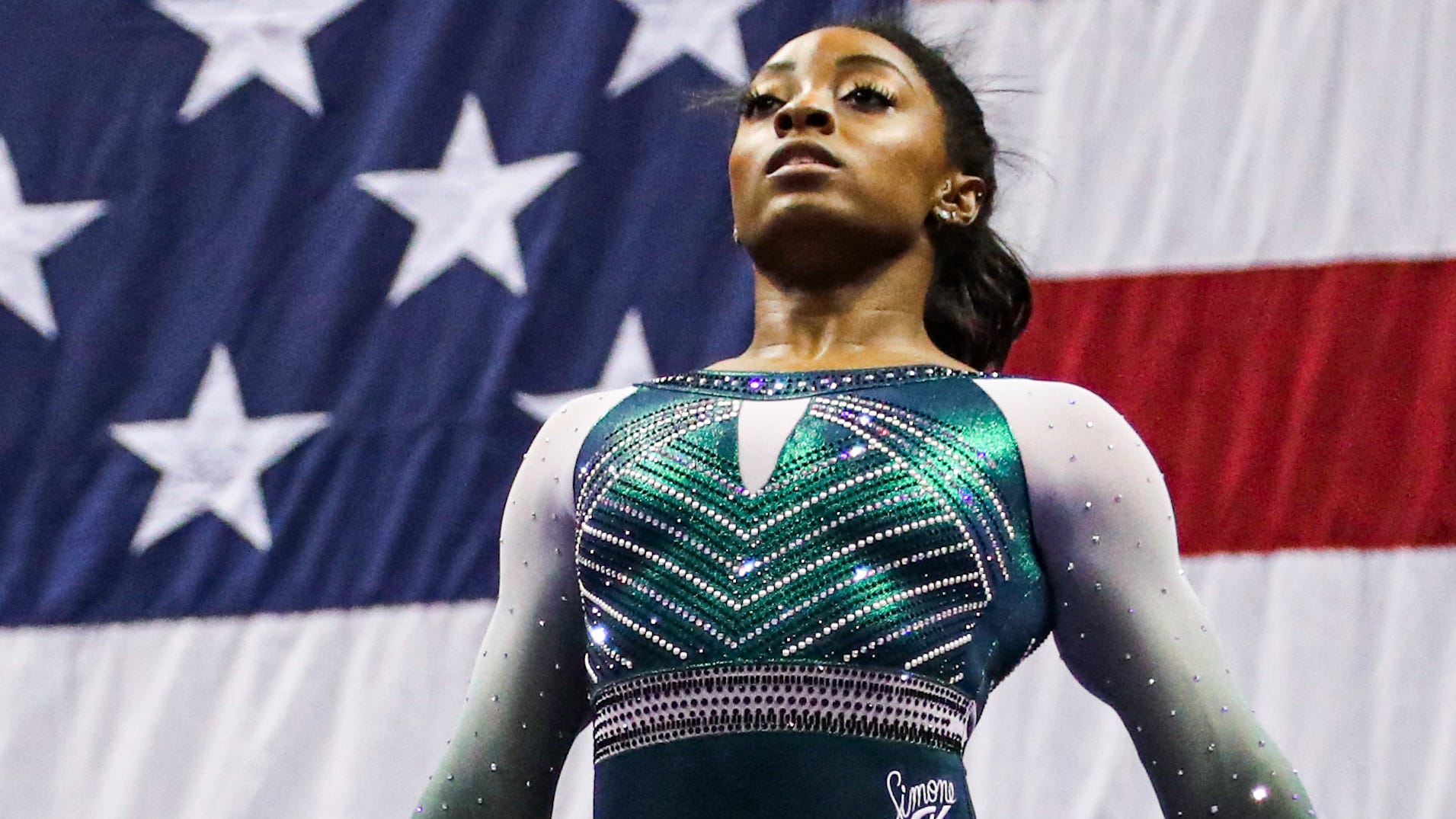
Earlier today, at a gut-wrenching press conference, Simone Biles explained why she stepped back from the team competition in the Tokyo Olympics. She felt that she needed some time to work on her mental health and mindfulness and didn't want for her team to suffer.
This simple act has brought so much heated debate to the internet. Some view it as Simone being a "quitter" while others view it as a moment to celebrate because she put her mental health first. The reality is probably somewhere in between, but whatever her reason, we should look to Simone Biles as an inspiration. All athletes, no matter what the sport, can take her actions and learn from them.
We don't know what struggles Simone is going through. In order to become an elite athelete, which she most certainly is, it takes years of relentless dedication. What she must have been going through in order to make the decision to step back on the stage she's been training for her whole life must have been tremendous.
The fact of the matter is, Simone was struggling. She knew it and she also knew that there was no coach that was going to "pull" her. When a pitcher struggles, there is a bullpen of other pitchers behind her waiting to pick up the slack. In softball, a coach makes that decision, however difficult it may be. In gymnastics, especially for someone like Simone, there is no bullpen waiting to relieve her. No coach was going to make that call. She had to do what she felt was best for herself and her team. And that's exactly what she did.
In sports, we are trained to win, we're trained to want the spotlight on us, we're trained to never give up. Simone Biles was also trained this way. She put her team first, knowing she couldn't compete at the level that was needed from her. That makes her the ultimate GOAT. Being selfless in order to elevate your team is the definition of a team player. All of our players should be willing to make that sacrifice for their team and sit the bench when they're not what's best for the team. That's what makes someone great, not selfishly hoarding the spotlight to the detriment of the team.
Lastly, Simone Biles is an inspiration for putting her mental health first. We forget that at the end of the day, for most of us, sports is just a recreation. Yes, occasionally scholarships are awarded and contracts are signed, but for the vast majority of players, this is something that is supposed to be enjoyable. Yes, we want to win. Yes, we throw everything we have into it. Yes, we empty the tank and leave nothing on the field. But sometimes, we need to sit back and think about ourselves first. We need to make sure that we are taking care of ourselves. We need to give ourselves permission to sit one out. Simone Biles isn't perfect, but by putting her team first, she showed today why she's so much stronger than we thought.
Good luck, Simone
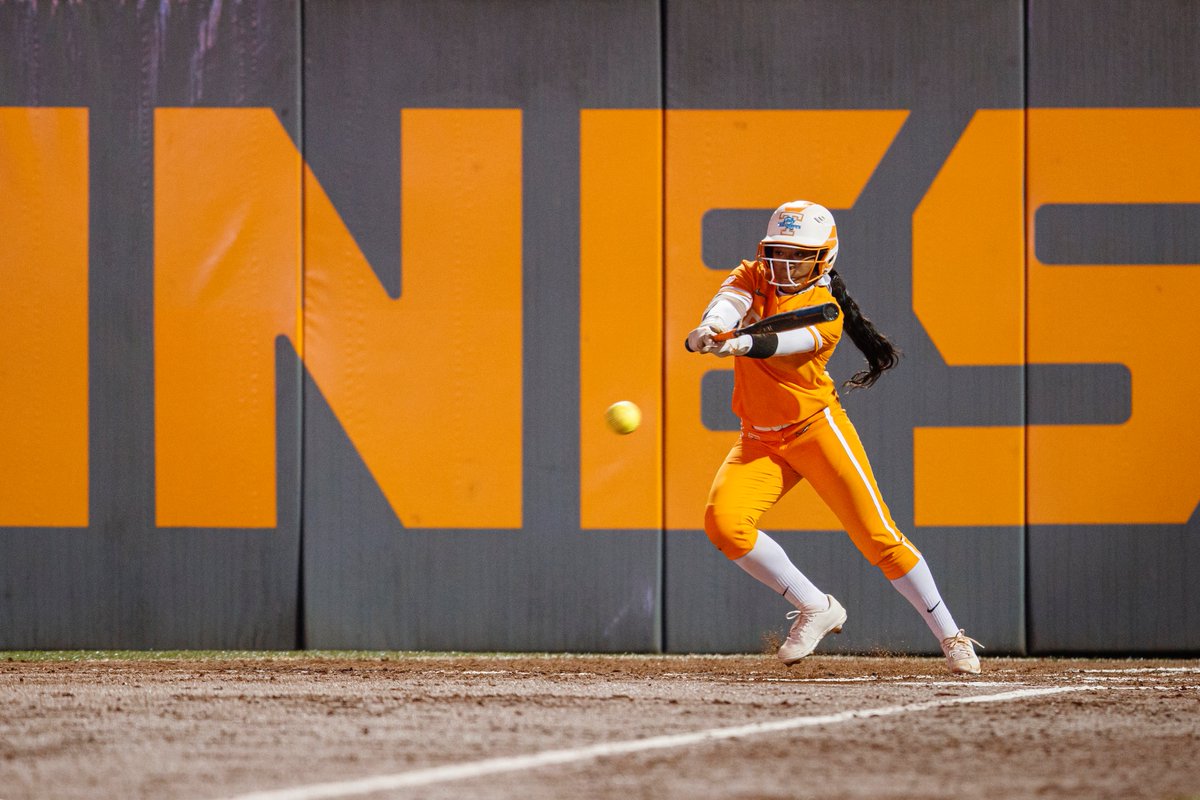
There are so many things that young slappers will do incorrectly when trying to slap. We will try to cover the most common slapping flaws and then tell you how to fix them.
Being too fast in the box
Oftentimes, slappers have this perception of having to be fast out of the box. We have to almost walk through the box, being calm and smooth. If we are too fast with our footwork in the box then we are going to eventually have to stop to make contact. We don?t want to start, stop, and start again. As we are making contact we want to make sure we are staying on our power line and not leaning or pulling out to first. Remember softball first and then track. Once we make contact we can run as fast as we can but until then SLOW & SMOOTH.
Too many steps to first base
As slappers we are typically fast, but we have to use every advantage we can to be safe. Anytime we are making contact we have to be in the front corner of the box. Majority of our plays are bang bang plays so we have to take every inch. When you get in the box, based on your height and your strides, start in a place that you know you will end at the front corner of the box every time. Your steps count as soon as you crossover and you do not want to be in the back or in the middle of the box at contact. Overall, a slapper should be taking thirteen steps or less to get to first base.
Not being able to differentiate between slaps
When it comes to differentiating slaps, slappers need to be aware mentally and physically that your contact point is going to vary. When we are drag bunting, we want to catch the ball out in front of our body. The key parts to bunting are a flat barrel, focusing on the top half of the ball, and using the last five inches of our bat. When soft slapping we want to let the ball travel deeper, catching it on our back leg and hitting the top half of the ball. On soft slaps our approach to the ball is not soft; we are still keeping our same bat speed and stopping at contact. Our chop is the same contact point as the soft slap. We are not stopping at contact but are rolling hard over the ball. With soft slap and chop we want the ball to hit as close to the plate. When hard slapping, also known as power slapping, we change our contact point to out in front so that we can hit the middle of the ball and let the pitcher supply the power.
Not reading the defense
Last but not least, we as slappers have to read the defense. Our job is to put pressure on them and be a hard out. How can we do that without reading how they are playing us? We can't rely on our coaches to help us. The defense can shift pitch by pitch or even mid pitch. We have so many tools in our back pocket that we should be reading the defense and adjusting. When the defense is playing in and in our face we want something hard. If the defense is playing back we want to give them something more soft for them to have to run in and get.
Be your best self
No matter what be YOUR best self. Work hard for YOU. Become mentally sound and a student of the game. The best performers are always putting in time training the fundamentals.
About Tianna Batts
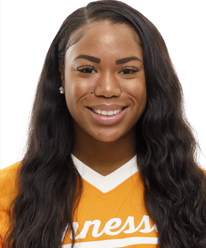
Tianna Batts is a former member of the University of Tennessee softball team, appearing in the NCAA Regionals and Super Regionals. She finished high school at 10-time State Champion Alexander Central and is ranked 5th in North Carolina history with a .549 batting average. She ranks 7th in North Carolina high school softball history in hits, 6th in runs scored, 3rd in stolen bases and 3rd with a 32-game hit streak. She was selected as an All-State athlete in 2013-2016 and was chosen as an All-American in 2015 and 2016. She is currently instructing at the Softball Project in in Stallings, NC

What Is Daddy Ball?
We've all heard about daddy ball and how we should avoid it. But what is daddy ball? In order to avoid it, we have to know what it is and what it looks like.Some people describe daddy ball as when a dad coaches his son or daughter. This isn't always the case. There are alot of good coaches who also happen to be dads. Others think it's when the dad-coach only focuses on his child. While this is certainly part of it, this isn't the root cause of daddy ball. Daddy ball is actually when the act of coaching is more about the dad than the kids on the team (including his own daughter)
Daddy ball dads coach because they want an ego boost, not to teach and grow the players on the team. While it outwardly may appear as if their daughter is the star of the show, in reality it's the dad that wants the spotlight.
How To Recognize Daddy Ball
Just being a dad-coach doesn't mean daddy ball is at play and in some cases a coach can be just as bad without even having a girl on the team. If you've ever watched a team and noticed the coach more than the players, you might be watching daddy ball.Here are a few signs to look out for when trying to identify daddy ball.
The coach makes the team about him. Watch what happens when the team loses. This is telling. If a coach berates his team or says how embarrassed he is then it's about him and not his team's growth. Of course a team needs to be held accountable when they have an off game but it should always be for their benefit, not because of how the coach feels or looks.
You can identify his daughter in a practice/tryout. The initial tryout is just as much for the player to tryout the team and coach as it is for the coach to tryout the player. If you can pick out the coach's daughter in the tryout, that could be an indicator of daddy ball. A dad that's overly aggressive or easy on his daughter is acting in a way that puts his feelings before the benefit of the team
He's "too good" to consider other points of view. Of course a head coach should be in charge because the wins and losses stop with him, but a coach that doesn't listen to outside points of view could be an indication that he's afraid of losing his power on the team. Since it's really about his ego, he will see anyone with a different opinion as a threat to him and as someone who should be punished and removed at all costs.
His daughter is the start of the show. This one may seem obvious, but it's not always easy to identify. Sometimes a daddy ball dad will form a team around his daughter so that his daughter is the best on the team. This guarantees no complaints about her play time but in the end it only hurts his daughter and confirms that the coaching is all about him. If he were to swallow his pride and get his "star" player on another team with better players, coaches and competition, she would grow much faster as a player. But daddy ball isn't about his daughter, it's about the dad.
What do you do if you are on a daddy ball team
Run. Seriously though, the first thing you should do is try and talk to the coach. It could be that he is well meaning and isn't aware of what he's doing. Always try talking first in a respectful way. If that doesn't work or your daughter is punished (she may sit the bench the whole next tournament) then the only thing left to do is find a new team. You and your daughter will be better off for it.Just be sure to keep an eye out for the warning signs above in your next tryouts

Division I rules limit student-athletes to four seasons of competition in a five-year period. The Council's decision allows schools to self-apply waivers to restore one of those seasons of competition for student-athletes who had competed while eligible in the COVID-19-shortened 2020 spring season.
The Council also will allow schools to self-apply a one-year extension of eligibility for spring-sport student-athletes, effectively extending each student's five-year "clock" by a year. This decision was especially important for student-athletes who had reached the end of their five-year clock in 2020 and saw their seasons end abruptly.

The spring and summer are filled with travel fastpitch softball practices, games, and tournaments, yet none of the three are possible currently. Teams are having a difficult time planning for the future and when they can return to the diamond.
Individual training can still be undertaken by fastpitch softball players and the good news is, technology makes it possible for coaches to advise each player on their practice. Apps that aid in sports training are at an all-time high right now. Players and parents seeking to train during the COVID-19 outbreak have plenty of options. Technology makes it possible for players to track their training whether it be hitting, throwing, fielding, or conditioning. The great thing about modern technology is the opportunities players have that were not possible 10 years ago.
Famer, an interactive sports coaching and training app, has seen its downloads and usage increase to levels never before seen in the last month. Famer is one of many apps on the market that is making it easier to stay connected at a time when teams cannot assemble.
According to Famer's website, it offers sports teams advanced technologies and custom training content production to enable team and personal training programs with interactive feedback between athletes and their coaches. The app had 5,000 users going into March; however, since the cancelation of amateur sports at the beginning of the month, the number of users has exploded far past that number. It is a rather advanced tool for softball teams but it isn't the only one that is being used.
There is practically an app for every sport. Softball is no different as a variety of smartphone applications make it possible for coaches, parents, and players to remain connected. The Team app, which is considered the world's No. 1 sports team application, is one of the more popular ways that teams stay in touch. Coaches can communicate and coordinate information with players and parents. Individual training sessions can be created and passed on.
While there are apps with advanced technology available for download, there are far simpler apps to use to stay connected. An app is anything you make it. Coaches can use something as simple as Facebook, YouTube, or Twitch to communicate with players. Softball coaches can simply record and upload training instructions and videos to YouTube and send out a private link to players. Teams can even communicate live via social media thanks to video chat.
Many of the apps softball teams can take advantage of are free to use. However, most offer exclusive features for a monthly subscription. Coaches and players simply need to find out just how they want to communicate and train during the COVID-19 outbreak. Each team will be different while the softball season is on pause. Coaches should explore their options for keeping their teams connected. An excellent training model during the COVID-19 outbreak could prepare softball teams for a successful campaign once the virus is over.
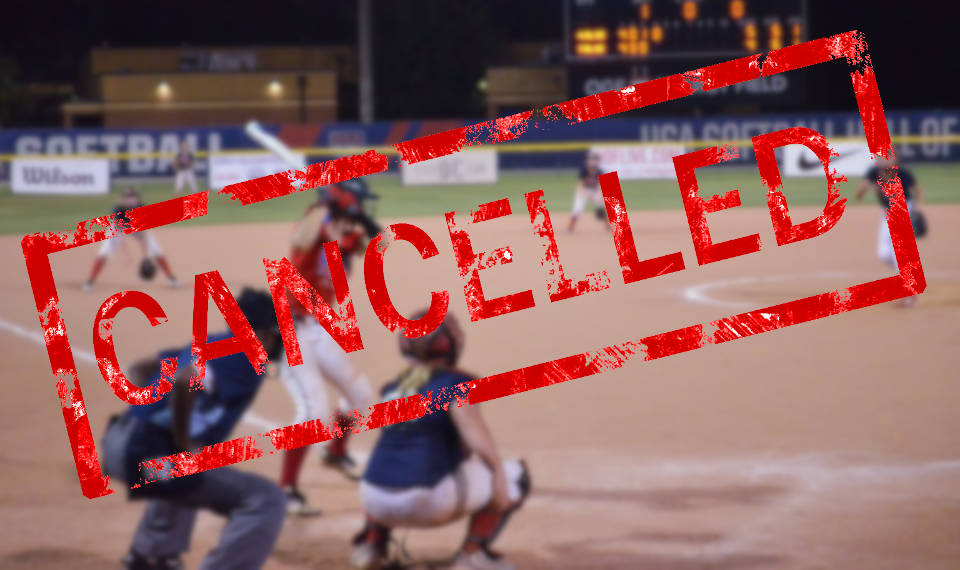
Softball teams just want to play
Every spring and summer in the United States, girls fastpitch softball teams gear up for the travel season. Tournaments around the lower 48 states take teams to every nook and cranny of the country. Yet, this spring and summer, those softball fields could be left empty as thousands of fastpitch travel softball teams remain at home. Tournaments are already being canceled if they haven't been already.
The US is currently on lockdown - or at least close to it - and there is no guarantee when measures will be lifted. The uncertainty has left teams unable to practice and plan for the summer ahead. It has also prevented tournaments from being organized by teams and sponsors. COVID-19 and the fear of contracting it has made it impossible to plan for a summer of travel fastpitch softball. Parents rightfully fear that their daughters could contract the virus and spread it to others. In addition, coaches do not want to put their players in harm's way and take unnecessary risks. In addition, parents, staff, and other individuals runs the risk of contracting coronavirus while traveling around the country to play fastpitch softball.
On March 15th, the CDC recommended events of over 50 people be canceled for eight weeks at the very least. The hope is the coronavirus will peak during that time and life can get back to semi-normality afterwards. The good news for girls travel fastpitch softball is the tournaments set for the summer could go ahead as planned. That is a best-case scenario. Of course, tournaments will be up to the organizers in the end and teams will participate if they feel it is possible to do so.
Training during the coronavirus outbreak
Softball players - and athletes of various sports - are now forced to stay fit and practice on their own. Outdoor activity is still allowed and athletes can work on fitness training on runs while practicing social distancing. Softball players have been able to use various training tools to keep their arms in shape. Pitch rebounders and even tires hanging from the back of a garage are being used by fastpitch softball pitchers to workout in spite of the tournament cancelations and practice absences. Although playing catch does technically offer the chance to be socially distant from other players, the throwing of a ball from one person to another can be risky. Therefore, playing catch with family members may be the only option players have to keep their arms in shape right now.
Spanish professional soccer club Leganes have used modern technology for players to connect with the team's athletic trainer during the country's lockdown. The club's trainer, Pol Lorente, used Twitch to contact players to demonstrate various exercises everyone can do.
Modern technology makes it possible for fastpitch softball coaches to stay in contact with players and to offer practices. While options for practice can be limited, there are ways that players can train on their own. It may take some creativity from coaches, however.
The hope for girls fastpitch softball teams is the future. Spring tournaments and some early summer ones may be canceled, but mid-summer could yield travel events. Of course, with the COVID-19 outbreak, anything can happen. In early February, there was no idea that the world's sports calendar - amateur or professional - could grind to a halt. Things changed quickly and once the coronavirus is contained and/or peaks, things could once again change rapidly.
At some point soon, this will all end and our girls will be back on the field. Let's all stay safe until then.
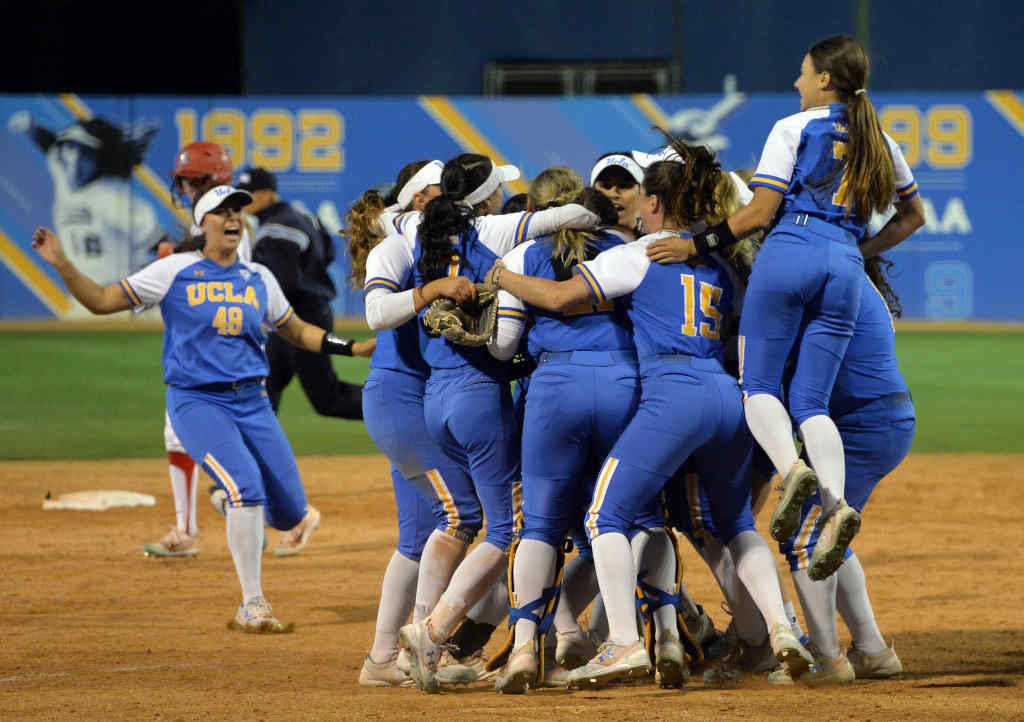
With schools and colleges closing thier campuses nationwide, it wasn't a surprising decision and Emmert chose to err on the side of caution as the Corona virus sweeps across the country.
While this may be the safe decision, it has to be painful for teams and players who look forward to the world series each year.
The full NCAA statement is available here.

Welcome to the club.
Sure, there are some girls that are fearless. There are girls that pick up a bat and just naturally know what to do with it. But there are others (like mine) that you feel will never get over their own fear long enough to make progress and there are still others that are somewhere in between.
What's important to realize is that there is no single "type" of softball player. Just like everything else, we have to teach our daughters to play to their strengths and work on their weaknesses. The worst thing you can do as a parent (and I speak from experience) is to tell yourself she just isn't ever going to get over her fear. She probably won't, and that's ok.
Softball needs timid girls. Those are the girls that think before they act. They're the ones that know where to throw the ball without thinking. They're the ones that understand the game. They're the ones that the coach can count on when he needs someone to get the job done. That's not to say that the fearless girls don't know those things too, plenty of them do. And to be honest, plenty of the timid girls don't get it easily either.
A little fear is healthy. There is a ball being thrown at her - hard. Ground balls can hurt when they hit you after a bad hop. It's normal and natural to be a little afraid. The key is to teach them how to work through their fears. There is no magic formula. Compassion and reps are your friend. Have compassion for her feelings (no Angry Dads) and work, work, work. The reality is she will probably never be fearless. She will always have a healthy fear of being hurt, but over time she will learn to deal with that fear.
Every girl has their own strengths and weaknesses. Some weaknesses are physical and some are mental. But each girl needs to work through them and will grow at her own pace. Don't allow your daughter to give up if she doesn't "get" it quickly. And more importantly, don't give up on her if she's growing slower than you'd like. If she loves the sport, that's all that matters.
Your daughters softball career is an investment, but not a financial one. The chances your daughter will end up getting a scholarship are very small. The price you will pay over the years will most likely be more than what you will ever get in return from a school. It is an investment in her, in her emotinal growth and in your relationship with her.
Relax and let her just be herself - fears and all.
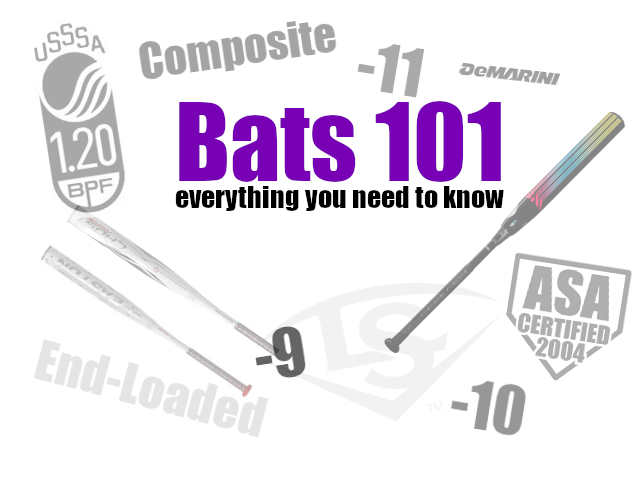
Fastpitch Bats 101
Buying a softball bat can be a confusing and expensive experience. It's tough to know what bat to buy and with some bats in the hundreds of dollars range it's important to get it right the first time. We have put together the most important information to help you understand all the different terminology and what it means to you as you browse for a new bat.
When buying a bat, you need to consider the size of the bat, the material, the construction, whether it is balanced or end-loaded and what certifications it has. Don't worry, we'll walk you through all that and you'll be a bat expert in no time.
Sizes
Clearly the biggest concern when buying a bat is getting one that's the right size. Bats are measure by length and weight, with the difference between them being the drop that you will sometimes see when a bat is advertised. The drop is usually represented by a negative number on the size or knob of the bat. For example, if a bat is 32" in length and weighs 21oz, it is considered a drop 11 (-11). A bat that is 31" long and weighs 22oz is a drop 9 (-9). Sometimes a bat will only display it's length and drop so you just need subtract the drop from the length to determine it's weight.You should generally get the heaviest bat that doesn't affect the swing speed of the batter. Since bat speed is the most important factor in the physics of batting, you don't want to add weight to a bat if it slows down the batter's swing. Adding weight with an identical swing speed will add to the force transferred to the ball and will generate more speed and distance.
What size is right for me?
JustBats.com has a great video you can watch here to help you find the right size bat.Material
Fastpitch softball bats come in one of 3 flavors: Alloy, Composite or Hybrid.- Alloy bats are constructed with a one-piece design and a single material (usually aluminum). Alloy bats are usually entry-level bats.
- Composite bats are made out of a mixutre of materials. These materials could be graphite, carbon fiber, fiberglass or kevlar. Composite bat construction allow for the bat to be made lighter, allowing for greater bat speed, while increasing the trampoline effect that occurs when the bat hits the ball. Composite bats are generally higher-end bats and for most competitive players the difference is noticeable.
- Hybrid bats are a two-piece design that features alloy parts and composite parts. These bats are usually mid-tier bats since they are not a fully composite material.
Construction
One-piece softball bats are made of the same material through the entire bat. The biggest advantage of a one-piece bat that it results on a stiff bat that flexes less. These types of bats are usually favored by power hitters.A two-piece softball bat has a handle that is separate from the barrel allowing the barrel to flex at the point of contact which creates a trampoline effect off the barrel. Two-piece bats also have less vibration in the handle since it is made of two pieces. This should help reduce sting in the hands when a ball is hit.
Balanced/End-Loaded
Bats can have their weight distributed in a couple of different ways. They can be balanced, which means the weight is distributed more or less evenly throughout the bat, or they can be end-loaded, which means more of the weight is concentrated in the end of the bat. The balanced vs. end-loaded choice is a much more personal one.Typically, end-loaded bats required more strength to get up to full speed on the swing, but since more of the weight is in the barel, there is more distributed to the ball on contact. Balanced bats, on the other hand, are easier to swing, but since less of their weight is in the barrel, less of the bat's weight is distributed to the ball. It's all about the physics of the individual batter's swing and for this reason, we absolutely recommend you should try a bat before you buy. It's a very personal decision and there are no cookie cutter answers.
Certifications
Last but not least, when purchasing a bat for a competitive team, you need to be aware of what certifications it has. Different tournament governing bodies require different certifications and some bats are not stamped for all tournaments. Making sure your bat is legal in the tournaments you play in is important to avoid tournament day surprises.Compare Bats
Since bats and the certifications they have can change as new models are released each year, we won't go into specific bats here, but you can see all the details for each bat on our Compare Bats page. Check it out for detailed specifics about top-tier bats and make sure your next bat purchase is the right one.
Coaches and Team Managers!
Have a team you're trying to grow? Need to add a couple more players for the upcoming season? Our Softball Map is the perfect place to add your team. You can give details about your team and your needs and add any contact information you want. Whenever a local player hits the site, they will see your team information in their map. Your team's information can also show up in our newsletter. What better way to make sure your team is always visible. Best of all, there's no cost ever for adding your team. It's our mission to make it easy for players and teams to come together, so it's absolutely free!
Click The Softball Map to add your team to the map!

We all know him. Some of us are him. And, if we're being honest, most of us have felt like being "that" dad at some point or another. Angry dad is easy to spot. Sometimes he's yelling at his daughter, other times he is angrily pacing behind the dugout, and still others he is walking hurriedly out of the ballpark 10 paces ahead of his daughter after "his" embarrassing loss. The thing that angry dad (and the rest of us occassionally) forget is that it's not about him. It's about our daughters.
Our only job as parents is to get them to practice, lessons and tournaments on time and support and love them each and every day. Of course, we should expect them to give us their all and to try their hardest, but for the most part, they do that already. The reality is that most dedicated players already know when they make a mistake. They know when they can do better and they know when they've let us down. They don't need angry dad to rear his ugly head and make them feel worse.
If you suspect that you may be angry dad, please take a minute to think about the message you're sending to your daughter. You're telling her that her performance in the game matters more to you than she does. You're telling her that she is an embarrassment to you. You're telling her that her worth is measured by how well she performs. Worst of all, you're telling her that she can't count on you to be in her corner when it counts.
She is learning a few things from you along the way, too. She's learning that she isn't as good as you want her to be. She's learning that nothing she does is enough. She's learning that she hates softball. She's learning that during the times angry dad is around, she doesn't like you very much either.
At the end of the day, some of our daughters will stop softball after a few years, some will go on to play for a D1 school, most others will fall somewhere in between. If you can control the angry dad in you, however, I promise that your daughter will develop more than just a wicked curve. She will develop a love of the game and a trust in you that is more valuable than any scholarship could ever be.
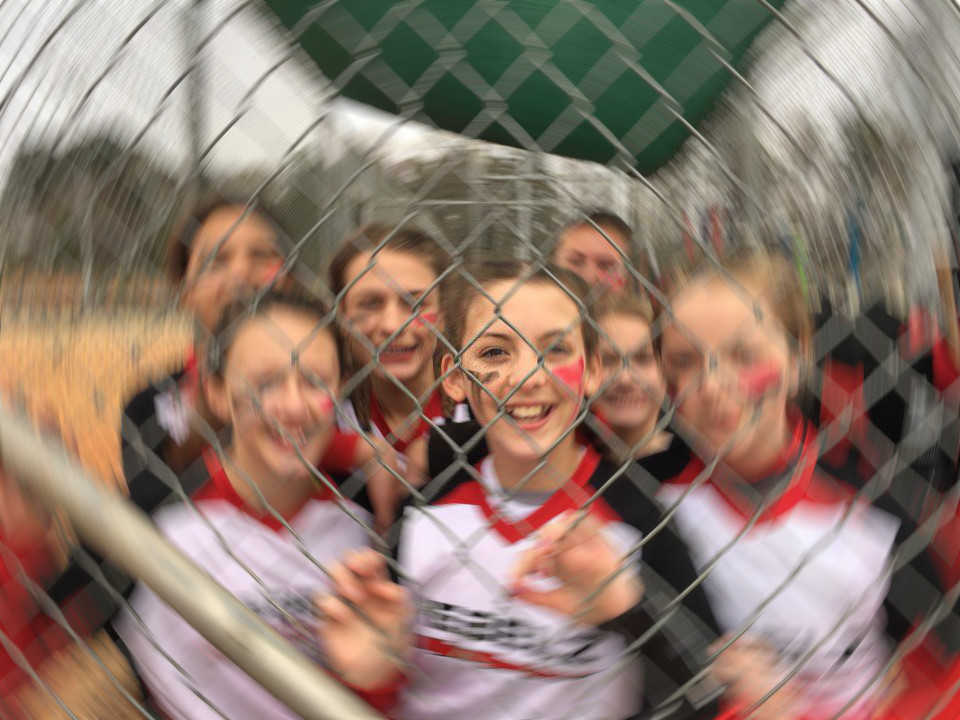
My daughter is a softball player. Throughout her life, she has done many other things: dance, gymnastics, soccer, cheer and more. There is no limit to the things she can do and I can't even guess at all the wonderful things she will experience, but for now softball is her thing. I don't know how long it will last, but I know I'll miss it when it's gone.
Softball has helped her grow from a quiet, shy little girl to the brave and confident young woman she is today. I credit it with so many positive things in her life, but really those positive things came from inside her. She used softball as a tool to grow. She used softball as a way to make friends. She used softball as a way to mature and become a better person.
What she didn't realize (and still doesn't) is what she was doing for me along the way. I have become a better parent because of softball. I had to learn to let her fail and deal with failure on her own. I had to learn that sometimes people don't see her the way I see her - and that's ok. I had to learn that in the end she didn't need me as much as I thought she did - and that's ok, too.
Some day, the early morning tournament drives will end, the days of sitting on a bucket and catching for her will end and my daughter will move on to her next thing. I know, though, that partly becuase of softball, my daughter is strong enough to handle whatever happens in her life. She is strong, fierce and brave. She is better than I ever was and I couldn't be more proud